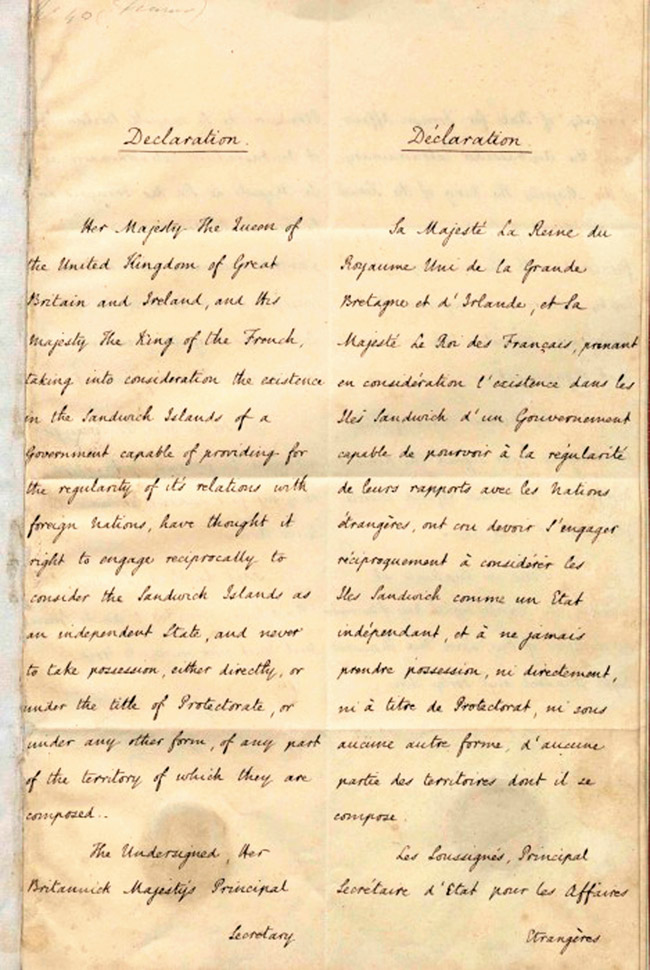Eyeing The Sovereignty Struggle

Great Britain and France recognized Hawaii’s sovereignty and independence Nov. 28, 1843 Parchment from the state archives
This ongoing discussion about Hawaiian sovereignty has gotten hilarious because of the claims to a nonexistent throne. Some even suggest the hanai’d Abigail Kawananakoa as queen, or maybe Quentin Kawananokoa as king, and/or his wife for queen. We have a half-dozen self-professed Hawaiian kings and many “marshals of the kingdom” and those who say that there’s no state of Hawaii, just an occupied kingdom.
It’s very intellectually embarrassing.
My favorite story is about the fellow who invaded Iolani Palace intending to sit on the throne he claims, but he did not because he could not find it.
The reality is that you cannot turn back the clock. The Hawaiian Kingdom can be compared to a singularity like a black hole. It was a star. It collapsed. It’s invisible, but its gravity tugs at some members of the Hawaiian community.
The state Supreme Court has said: “To date, no sovereign native Hawaiian entity has been recognized by the United States and the state of Hawaii.”
And one of the court’s most telling rulings was that “individuals claiming to be citizens of an independent sovereign entity are not exempt from the state’s laws.”
Case closed? No, there could arise a new one on new grounds to be heard by a much-changed court.
Of course, there are those activists who say, “Your courts are illegitimate because we’re an occupied country.” Should they accept a favorable ruling if it came from an “illegitimate” court?
Can sovereignty people turn to an international court? No, because these are state matters of land claims and political control, and not under the jurisdiction of any international body.
I’m not against sovereignty being up for discussion. But with whom? Names on a petition of some people who claim
Hawaiian blood? A person self-proclaimed as Kahuna Nui? OHA? Delegates are voted in by all citizens of Hawaii, not just Hawaiians.
Are Native Hawaiians a “tribe” entitled to federal recognition? The U.S. government never dealt with them that way. And if you like tribal status, you’ll be up against many Native Hawaiians who say they reject that.
Some want to revert to Queen Lili’uokalani time. But she was only made throne heir by her brother, Kalakaua, who had been elected king. So there’s reason to say there was no traditional kingdom after Kamehameha V’s death. Both Lunalilo and Kalakaua were elected.
I mean no disrespect to Native Hawaiians who want more control over their diffused culture. I’m just asking: sovereignty? Who gets it and who runs it?
If you say the descendants of Kingdom of Hawaii citizens before the 1893 overthrow, that includes a lot of you because the June 1, 1893, census listed the following:
Natives and half-castes 40,612; Chinese 15,301; Japanese 12,360; Portuguese 8,602; Americans 1,928; British 1,344; Germans 1,034; Polynesians 588; Norwegians 227; French 70; other foreigners, 419.
Maybe they all want a piece of the sovereignty action.
BanyanTreeHouse@gmail.com





